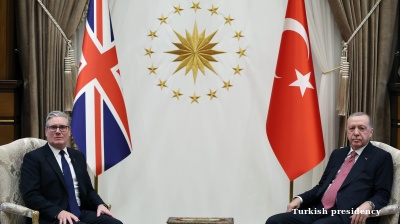President Recep Tayyip Erdogan’s calling of an emergency meeting on Turkey’s economy raised hopes of an extraordinary tightening and caused the Turkish lira (TRY) to rebound from its all-time low of 4.3780 to the dollar recorded in early trading on May 9 to 4.25 levels. However, as the day wore on and no news emerged from the closed-doors debate, the TRY slipped back to around 4.30 by mid-evening.
Officials said Erdogan had summoned the government’s economic team to his Ankara palace for 14:00 local time to discuss the plight of the TRY, sparking optimism that a ‘snap’ interest rate hike could be in store before the snap parliamentary and presidential elections scheduled for June 24. “I think the market is buying the hope that this meeting will produce a decision to hike,” said Inan Demir, an economist at Nomura International.
The TRY has been hammered by more than 11% against the dollar so far this year. Turkey’s domestic mix of economic woes, such as double-digit inflation and an overheating economy, have combined with international negatives—including the expectation of Fed rate increases amid a strengthening dollar partly driven by rising US inflation expectations—to undermine the currency. The sharp nosedive seen on May 9 was much blamed on Donald Trump’s announcement on May 9 that he is pulling the US out of the Iran nuclear deal and reimposing the highest-level sanctions on Iran—they are expected to hit Iran’s oil exports, exposing Turkey which is a big energy importer.
Any Turkish officials attending the meeting with Erdogan who believe extraordinary tightening is needed will have to convince the president of their case. Throughout the devaluation of the TRY across 2018, Erdogan has regularly called for loosening, saying the unorthodox approach is right for Turkey’s economy in order to provide cheaper money that will push up investment and growth and create jobs. The central bank’s governor Murat Cetinkaya was due to attend the meeting, according to various local reports. Investors are worried that Erdogan, who said on May 8 that the weakness of the TRY does not reflect the true state of the economy, has been undermining the independence of the central bank’s monetary policy committee.
Rabobank said that given the extent of Turkey’s mounting economic imbalances, a rate hike of at least 200 basis points is needed.
10-year bond yield hits 14.18%
Also on May 9, the yield on the benchmark 10-year Turkish bond climbed to a record 14.18% in early trade from 14.04% on the previous day, but recovered to 13.99% after news broke of Erdogan's meeting. The main BIST-100 share index closed 1.43% higher at 100,780.57 points, after tumbling to its lowest level in 11 months early in the session. Turkey’s 5-year credit default swaps (CDS) moved up to the highest level in 15-months, increasing 9 basis points from the May 8 close to 259 basis points, according to IHS Markit data compiled after Trump’s nuclear deal announcement.
Part of the TRY’s recovery on May 9 was ascribed to the central bank’s announcement that it has hiked the maximum amounts on its TRY-settled forward foreign exchange sale auctions and auctions on foreign exchange deposits against TRY deposits.
In its first announcement on May 9, the central bank said that it updated the calendar for Turkish lira-settled forward foreign exchange sale auctions to be held in the second quarter of 2018. Accordingly, the maximum total amount for a forward foreign exchange sale position may increase from its current level of $5.3bn to $7.1bn.
Simultaneously, the central bank said in a second statement on the day that the daily amount of foreign exchange deposits against TRY deposits in auctions has been increased from $1.25bn to $1.5bn.
Accordingly, the maximum total outstanding deposit volume in the auctions, which is currently $6.25bn, may reach up to $7.5bn.
News

Nigeria's Heirs Energies' CFO on powering growth via sustainable, indigenous-led development
NewsBase speaks exclusively to Samuel O. Nwanze, Executive Director and Chief Financial Officer of Nigerian indigenous integrated oil and gas company Heirs Energies.

Brazil's Lula "horrified" as Rio police raid death toll reaches at least 130
Brazilian President Luiz Inácio Lula da Silva expressed shock at the fatalities from a massive police operation targeting Rio drug gangs that left scores dead, while residents and rights advocates accused authorities of summary executions.

Nigeria's NNPCL weighs technical equity partnerships to revive idle state-owned refineries
NNPCL is reviewing options to bring the Port Harcourt, Warri and Kaduna refineries back into meaningful operation, possibly by bringing in technical equity partners to upgrade or repurpose units.

Situation critical in Ukraine’s frontline key logistics hub Pokrovsk
Russian infantry units have breached Ukrainian defensive lines and entered the key eastern logistics hub of Pokrovsk, sparking intense street fighting and threatening to encircle Ukrainian forces as the situation becomes "critical."


_Cropped_1761809941.jpg)

